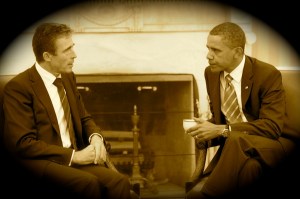NATO Secretary General Anders Fogh Rasmussen slipped in and out of the White House Tuesday like some ancient daguerreotype, his brief visit memorialized only in still photographs — no video, no reporters, no questions, no answers. Perhaps President Obama’s handlers didn’t want another round of bashing like last week’s, when critics — including Obama loyalists — complained that his Oval Office address on Iraq was a distraction from what they view as more pressing economic concerns. Maybe they didn’t want the press to compare the economic and Afghan scenarios, where Obama has tried to thread the needle between warring sides in his efforts to come up with a Goldilocks solution that has pleased neither. Or perhaps his aides simply glanced at the calendar, and realized that a month from Tuesday the war in Afghanistan will enter its 10th year.

Rasmussen and Obama meet Tuesday/NATO photo
But the NATO boss was talking over breakfast three hours before his White House session, explaining why this war has dragged on for so long. “To give an honest answer, I think we have underestimated the challenge right from the beginning,” he told reporters. Winning in Afghanistan isn’t only about killing Taliban and al Qaeda militants. “We have to make the whole Afghan society inhospitable for terrorists,” Rasmussen said, and that requires a non-corrupt government and economy. “I don’t think we realized that at the early stages of this mission.”
He spun the war as well as a non-native English speaker could spin it in English. The former Danish prime minister, who has been running the North Atlantic Treaty Organization since August 2009, said a timetable for progress in Afghanistan is in place at last. The effort, he said, is finally getting the resources it needs to beat back the enemy, and begin shifting control of the fight over to the Kabul government. That’s supposed to happen beginning next July, according to Obama’s declared schedule. When will it end? “I can tell you when it will begin, I can tell you when it will be completed, but I can’t tell you exactly what will be the time distance between these two points,” Rasmussen said.
He envisions a “gradual transition” that will be “condition-based not calendar driven.” If all goes according to plan, Afghanistan hopes to be able to handle its security challenges on its own by the end of 2014, Rasmussen said. But then, another caveat intruded. “I give you no guarantee that we will be in that position by the end of 2014,” he added. “We will not leave until we have finished our job.” He elaborated on how well things are going across much of Afghanistan. “In two-thirds of the country there is little fighting and quite a bit of development,” he said. “In the south and east, there is a lot of fighting and it is tough every day.” (Of course, a marine engineer could have said the same thing about the integrity of the Titanic’s hull following its unfortunate meeting with the iceberg.)
Following their Oval Office meeting, the White House issued a short statement noting that “the President thanked the Secretary General for the significant NATO commitment to promoting peace and stability around the world, particularly in Afghanistan where nearly 50,000 non-U.S….troops, trainers, and civilians are serving alongside Americans with distinction.”
Back at breakfast, Rasmussen went on to denounce the planned burning of Korans by a Pastor Terry Jones’ Dove World Outreach Center in Florida this Saturday, the ninth anniversary of the 9/11 attacks. “It’s a disrespectful action,” he said, “and in general I really urge people to respect other people’s faith and behave respectfully.” Rasmussen also endorsed General David Petraeus’ request for an additional 2,000 troops to help train Afghan security forces. He said he sees no conflict between that and Obama’s push to pull out starting next July. “You might say that trainers are the ticket to transition,” he said, adding that no one yet knows what nation(s) might supply the extra troops (the Pentagon said it expects the allies to provide them).
Rasmussen is convinced the Afghan strategy is on the right track at last. “I’m deeply convinced that it will work,” he said, adding that the political clock is beginning to run down. “There is a strong political desire to demonstrate clear progress in Afghanistan for good reasons — because our publics are impatient,” he said as breakfast wrapped up. “Progress would be to see physically lead responsibility handed over to the Afghans so that people can actually see the light at the end of the tunnel.”


